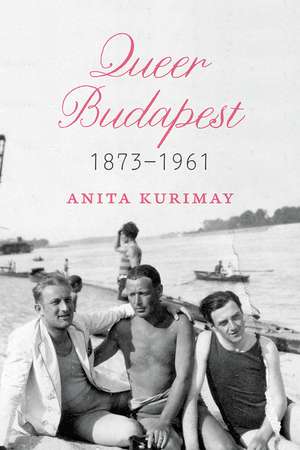Queer Budapest, 1873–1961
Autor Anita Kurimayen Limba Engleză Paperback – 2 noi 2020
Kurimay explores how and why a series of illiberal Hungarian regimes came to regulate but also tolerate and protect queer life. She also explains how the precarious coexistence between the illiberal state and queer community ended abruptly at the close of World War II. A stunning reappraisal of sexuality’s political implications, Queer Budapest recuperates queer communities as an integral part of Hungary’s—and Europe’s—modern incarnation.
| Toate formatele și edițiile | Preț | Express |
|---|---|---|
| Paperback (1) | 264.40 lei 6-8 săpt. | |
| University of Chicago Press – 2 noi 2020 | 264.40 lei 6-8 săpt. | |
| Hardback (1) | 620.03 lei 6-8 săpt. | |
| University of Chicago Press – 14 dec 2020 | 620.03 lei 6-8 săpt. |
Preț: 264.40 lei
Nou
Puncte Express: 397
Preț estimativ în valută:
50.59€ • 54.10$ • 42.18£
50.59€ • 54.10$ • 42.18£
Carte tipărită la comandă
Livrare economică 18 aprilie-02 mai
Preluare comenzi: 021 569.72.76
Specificații
ISBN-13: 9780226705798
ISBN-10: 022670579X
Pagini: 336
Ilustrații: 16 halftones
Dimensiuni: 152 x 229 x 36 mm
Greutate: 0.45 kg
Ediția:First Edition
Editura: University of Chicago Press
Colecția University of Chicago Press
ISBN-10: 022670579X
Pagini: 336
Ilustrații: 16 halftones
Dimensiuni: 152 x 229 x 36 mm
Greutate: 0.45 kg
Ediția:First Edition
Editura: University of Chicago Press
Colecția University of Chicago Press
Notă biografică
Anita Kurimay is assistant professor of history at Bryn Mawr College.
Cuprins
Introduction. Sexual Politics in the “Pearl of the Danube”
1. Registering Sex in Sinful Budapest
2. The “Knights of Sick Love”: The Queers of Kornél Tábori and Vladimir Székely
3. Rehabilitating “Sexual Abnormals” in the Hungarian Soviet Republic
4. Peepholes and “Sprouts”: A Lesbian Scandal
5. Unlikely Allies: Queer Men and Horthy Conservatives
6. The End of a Precarious Coexistence: The Prosecution of Homosexuals
Epilogue. Queers and Democracy: The Misremembering of the Queer Past
1. Registering Sex in Sinful Budapest
2. The “Knights of Sick Love”: The Queers of Kornél Tábori and Vladimir Székely
3. Rehabilitating “Sexual Abnormals” in the Hungarian Soviet Republic
4. Peepholes and “Sprouts”: A Lesbian Scandal
5. Unlikely Allies: Queer Men and Horthy Conservatives
6. The End of a Precarious Coexistence: The Prosecution of Homosexuals
Epilogue. Queers and Democracy: The Misremembering of the Queer Past
Acknowledgments
Notes
Bibliography
Index
Notes
Bibliography
Index
Recenzii
"There is much to comment about this study: it provides nuanced analysis of discourses on and legal treatment of homosexuality and paints a vivid and empathetic portrait of queer life in Budapest across nearly a century. Moreover, it is a significant contribution to histories of urban modernity, women and gender, socialism, and conservatism in Hungary, the East Central European Region, and Europe. In addition to Queer Budapest's scholarly contributions, Kurimay's reflections on methodology and the challenges of researching sexuality in general and in Hungary specifically are invaluable for students and scholars planning to undertake historical research on sexuality. But perhaps most importantly, Kurimay provides a vital refutation of the claim that queer life has no history in Hungary."
“Anita Kurimay’s book is important not only as an amazing critical history of a rich array of sources on same-sex sexuality in Hungary from the late nineteenth century to the decriminalization of homosexuality in 1961, but also as a challenging response to widespread beliefs that often form the basis for attacks against the LGBT+ community in Hungary.”
“With its rich readings of cultural, medical, and police records, Queer Budapest makes a major contribution to our understanding of modern queer European history. Kurimay’s vivid exploration of how political regimes of twentieth-century Hungary conceived of the queer in their midst illuminates the tangled relationship between politics and sexuality.”
“Filled with riveting subplots—from rural servants’ interpretations of aristocratic lesbianism to the brutal eugenic fantasies of Arrow Cross fascism—Kurimay’s book traces the paradoxical twists and turns in Hungarian authorities’ handling of homosexuality. Queer Budapest felicitously and brilliantly scrambles all our usual assumptions about the relationships between sexual and other kinds of politics.”
"From Kurimay's pen, a title as simple as an adjective, a place name and a range of dates is also a manifesto, insisting on a continued queer presence that defies far-right visions of the Hungarian past."
"Anita Kurimay’s brilliant and innovative Queer Budapest, 1873–1961 is an
important contribution to the new body of work on the history of sexuality in East Central Europe. . . She shows that throughout the twentieth century consecutive Hungarian regimes were generally silent about homosexuality, which, on the one hand, gave queers a certain degree of freedom (so they could lead their lives unnoticed) but, on the other, erased them from history. . . In this context, reinstalling queers in Hungarian history is a political act meant to combat homophobia and
oppression."
important contribution to the new body of work on the history of sexuality in East Central Europe. . . She shows that throughout the twentieth century consecutive Hungarian regimes were generally silent about homosexuality, which, on the one hand, gave queers a certain degree of freedom (so they could lead their lives unnoticed) but, on the other, erased them from history. . . In this context, reinstalling queers in Hungarian history is a political act meant to combat homophobia and
oppression."
"Queer Budapest is an important book that paints a complicated picture of the tensions between sexual repression and liberation throughout the twentieth century in Hungary as well as in Central and Eastern Europe."
